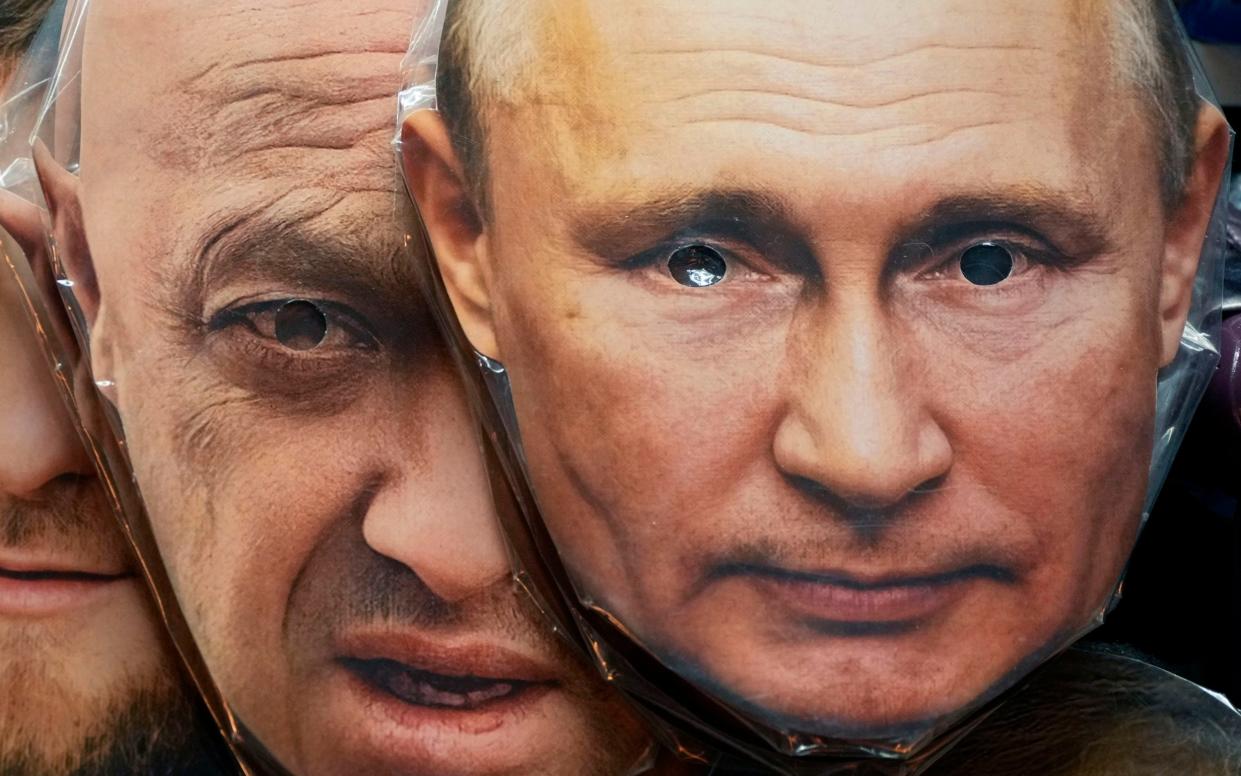Vladimir Putin’s humiliation is far from over

- Oops!Something went wrong.Please try again later.
- Oops!Something went wrong.Please try again later.
Even in Russia, Vladimir Putin looked feeble when he cut a desperate deal back in June with the mercenary Yevgeny Prigozhin to stop his astonishing march on Moscow. The Wagner Group had taken the Kremlin, and the world, by surprise: surely such an act could not go unpunished? Yet such was the precariousness of the Russian president’s position that he extended a hand to the man who had humiliated him.
The apparent death, therefore, of Prigozhin, the man dubbed “Putin’s chef”, has led many to argue this is a fundamental reassertion of the Kremlin authority: that the Russian president is back at “full strength”. Perhaps the brutal nature of the supposed assassination – a plane shot out of the sky, or blown up from within – has contributed to this narrative. Other potential centres of authority will see what happens if they betray him. There is no possibility of dissent; no alternative sources of power. Putin is back in charge – or so the argument goes.
But what if the opposite is true? That far from solidifying Putin’s authority, the Russian president may be, if anything, more vulnerable now than he was before?
It is surely not a ridiculous idea. Among ordinary soldiers, there was huge sympathy for Prigozhin’s coup attempt, especially among those who believed that Putin was being too soft on Ukraine. He was the soldiers’ champion, speaking out against the regime’s strategic failures and holding back of equipment.
Furious Wagner supporters, meanwhile, are already saying they will avenge their slain leader: he was the only one in the Russian command in their eyes capable of battlefield success in Ukraine, such as the seizure of the town of Bakhmut – albeit after nine-months of horrific violence. Putin may not even be able to purge Wagner entirely: if he did, where would that leave his Africa strategy?
What about the elite – fearful, yes, but hardly likely to be genuinely more loyal now than they were before they saw the images of Prigozhin’s plane in flames? While many of them rolled their eyes at Wagner’s leader – considering him a maverick and an air-head – plenty shared his anger at the way this war has been conducted.
They will surely be evaluating the risks of staying in Putin’s orbit: if this is how he treats his former allies, who among us is safe? The unsuccessful war in Ukraine has already thinned their wallets; now their lives may be at stake. Will they wait their turn or try to outrun the Russian president? The prospects of a change of power in Russia, which some months ago seemed absolutely impossible, have been permanently raised due to Putin’s suicidal and destructive policy against his own people.
Ultimately, the context of Prigozhin’s supposed death is not a regime in the throes of victory or success, but a failing power that is failing more each day. Russian military losses have already reached 300,000; its economy is in crisis. Until last year’s invasion, Russia could dictate the shape of the European energy market and blackmail the world’s most powerful states.
Now Putin has turned the country into a pariah, spending billions of unstable rubles on rockets to fire them at cities in Ukraine. For the man in the street, these truths are becoming increasingly inconvenient; for the ardent nationalist, they are a humiliation.
The full-scale invasion of Ukraine has lasted 18 months, and the war as a whole for almost 10 years following the annexation of Crimea in 2014. Putin cannot achieve the victory on the battlefield he promised, but given Kyiv has no appetite for negotiation, neither can he secure a face-saving peace. The demise of Prigozhin has also shown what Putin’s word is worth: this is a man to whom he offered clemency, yet within two months of their agreement he is apparently dead.
Yesterday evening, Putin sent his condolences to Prigozhin’s family, remarking that he was a person who had “made serious mistakes in life”. The same could obviously be said of the Russian president. Nobody can predict what his fate will be, but it is unlikely to be a quiet retirement on the Black Sea coast. And if he does fall, he will seek to drag the whole of Russia down with him.
Svitlana Morenets is a Ukrainian journalist and staff writer for The Spectator

